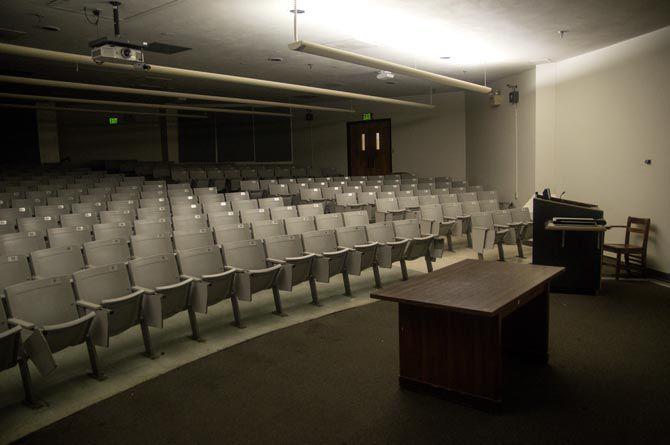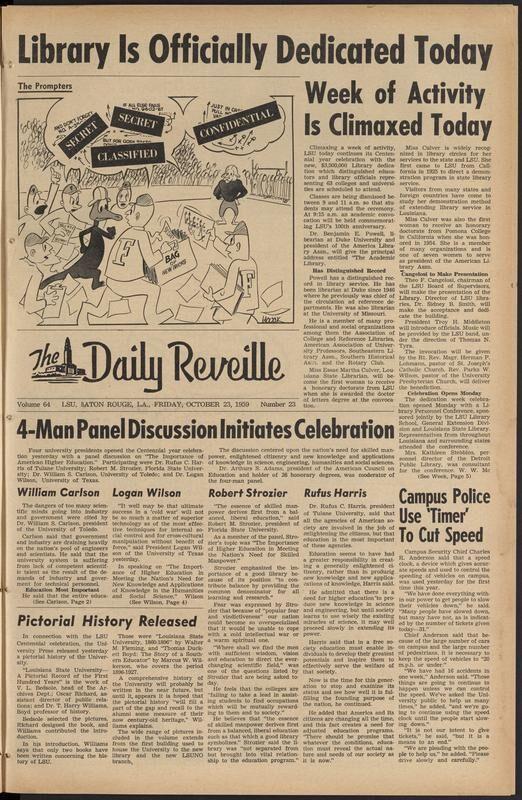Two LSU Faculty Senate members withdrew their proposal to require all undergraduate students to take an introductory African and African American Studies (AAAS) course after the body passed a motion to move it to committee. The two senate sponsors saw the motion as a “stall tactic” and felt it proved the University and the Faculty Senate are not yet ready to confront anti-Blackness at LSU.
During the Jan. 25 meeting, five senators and several LSU departments aired logistical concerns about the resolution, specifically highlighting the lack of information surrounding its implementation. Following this, Political Science Associate Professor Daniel Tirone proposed a pre-written motion to send Resolution 20-05 to a special committee to address those concerns.
The resolution’s co-sponsor, Entrepreneurship & Information Systems Associate Professor Sonja Wiley, then withdrew the resolution “in an effort to mitigate stall tactics, delay techniques and the ultimate ‘watering down’ of the primary objective and purpose of the resolution.”
Multiple senators who offered public comment at the meeting said that while they valued inclusion and diversity and supported efforts to promote these values at the University, they needed more information about the resolution and preferred to review it in committee before agreeing on its implementation.
This frustrated Wiley and Child and Family Studies Professor Cassandra Chaney, the resolution’s other co-sponsor, who were seeking a firm commitment from the body, with resolve to settle logistics later. If the senators were unwilling to commit, Wiley said, then she, Chaney and the authors were unwilling to devote even more time and energy to a likely fruitless cause.
“You’re damn right I’m mad. I’m mad about what went down,” Wiley said. “I’m mad because Cassandra [Chaney] and I have been used.”
“This is all window dressing,” Chaney said. “It’s just made to appear as if LSU is progressive and cares about the experiences of Black people.”
“We are tired and we are exhausted from the invisible workload of diversity at LSU,” Wiley said. “We have worked on this for almost a year — we have put in blood, sweat and equity. We have been doing it for no money but out of passion.”
Wiley and Chaney previously held discussions with the creators of the resolution — Religious Studies and AAAS Associate Professor Stephen Finley, Sociology Associate Professor Lori Martin, English Associate Professor Chris Barrett and Vice Provost for Academic Programs and Support Services Matthew Lee — and agreed to withdraw if a motion was passed to committee the bill.
“We, the committee that wrote the resolution, understood that this was a possibility and agreed that if this happened that we would refuse to be part of a process aimed at delaying the resolution and/or de-centering anti-Blackness,” Martin wrote in an email to the Reveille.
While Tirone said he understands the frustration those involved with the resolution are experiencing, he said committees are an integral part of the Faculty Senate’s functioning. The senate has 14 standing committees, not including special committees designated to specific policies.
“I am confident that the committee that was proposed would have made every possible effort to find a solution that would have made a significant improvement in the way the very real concerns at the heart of the original resolution are incorporated into the curriculum given the constraints faced at LSU,” Tirone said. “The proposal would have found support among a broad coalition of the faculty.”
Wiley and Chaney both pointed out that copious research had already been conducted prior to the resolution’s proposal, arguing that nothing further should have been required.
“It is unfortunate for our deserving LSU students, that Dr. Chaney and I do not have the personal or professional capacity at this time to continue researching and investigating a matter that has already been thoroughly studied, explored, documented, published, courses created, taught and a resolution written about,” Wiley said.
Because the resolution was withdrawn, no further action will be taken regarding this specific policy, although others like it could be proposed.
Resolution 20-05 would have implemented AAAS 2000 as a required course for all LSU undergraduates as part of their Integrative Learning Core (ILC) obligations, which allow students to select courses with overlapping material and receive additional “proficiencies” in areas like ethical reasoning, intercultural knowledge and competence, quantitative literacy and written communication.
The course focuses on “anti-Blackness” and the history of racism in Louisiana, as well as on LSU’s campus. The resolution originated with LSU’s new Black Student Athletes Association (BSAA), which approached Martin last summer about facilitating a curriculum change.
“The resolution came to be as a result of a long history of anti-Black violence, one of the organizing principles of the country and its social and political life,” Finley said. “[It] was meant to offer an opportunity for students to think differently about the world and about a country that often avoids the subject in polite conversation. It could have been another step in helping to cultivate better citizens.”
The authors felt this course was necessary for all LSU students because the material is generally overlooked in high school classrooms. Wiley also suggested that faculty and other University employees take the course, noting that anti-Blackness has been a consistent theme at the University since its inception.
Several senators and professors felt that while the course covers African American history, it did not adequately include other cultures and races, such as Native Americans, in its curriculum.
Wiley and Chaney responded to these criticisms by explaining that the course was not meant to be anything other than a tool used to inform students about anti-Blackness, as requested by the Black Student Athlete Association.
“When it comes to diversity, I’m all for it,” Wiley said. “[But] this resolution wasn’t about multiculturalism and diversity broad-spectrum. This resolution was speaking specifically to the Black hatred, the Black racism that exists on this campus, in this city, in this state and in these United States.”
Yale and UCLA, among other universities, are examining the possibility of implementing a policy similar to LSU’s Resolution 20-05, but most of these universities’ proposed classes are broader in their scope of diversity.
Other concerns included the financial cost of hiring enough professors to teach the additional sections of the course. In order to accommodate the approximate 6,000 students in every LSU freshman class, an additional 131 sections of the class would need to be added, according to Math Professor Julia Ledet.
“The most resource-intensive, but likely most beneficial format would be to have students in sections of no more than 35 to 50 students, which would require scaling up from three sections a year to over 100,” Tirone said in the meeting. “These considerations must be taken into account because policies which aspire to advance important goals will fail if they cannot be effectively implemented.”
The Board of Supervisors promoted AAAS from program to department status on Jan. 15, granting the unit significantly more resources for hiring, researching and expanding its array of classes. However, Religious Studies Associate Professor Stuart Irvine said he fears the cost of hiring so many new AAAS professors is that there would be very little money left over to fill faculty vacancies in other departments.
Based on their concerns, senators in support of the motion to committee the resolution insisted they were acting in good faith. The authors of the resolution are skeptical.
“We know a stall when we see one,” Wiley said. “I’m tired of being played. I have done diversity work for free for far too long, and if I’m not going to be on a committee that’s going to have policy that reaches fruition, I’m not doing it.”
Reaction from the LSU community has been mixed — some students say they’re relieved the bill was withdrawn, while others are indignant at the “anti-Blackness” of LSU’s administration.
“I’m ready for a change. I’m tired of working and not seeing a change,” Wiley said. “It’s beyond disappointing; it’s heartbreaking and it’s frustrating.”










